President of Brazil
The president of Brazil (Portuguese: Presidente do Brasil), officially the President of the Federative Republic of Brazil (Portuguese: Presidente da República Federativa do Brasil) or simply the President of the Republic, is both the head of state and the head of government of Brazil. The president leads the executive branch of the federal government and is the commander-in-chief of the Brazilian Armed Forces. The presidential system was established in 1889, upon the proclamation of the republic in a military coup d'état against Emperor Pedro II. Since then, Brazil has had six constitutions, three dictatorships, and three democratic periods. During the democratic periods, voting has always been compulsory. The Constitution of Brazil, along with several constitutional amendments, establishes the requirements, powers, and responsibilities of the president, their term of office and the method of election.[3]
| President of the Federative Republic of Brazil
Presidente da República Federativa do Brasil | |
|---|---|
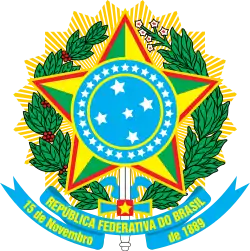 | |
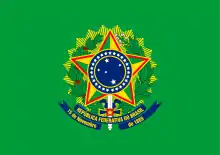 | |
| Federal government of Brazil | |
| Style | Mr. President or even simply President[1] |
| Status | Head of State Head of Government |
| Member of | Cabinet National Defense Council |
| Residence | Palácio da Alvorada |
| Seat | Brasília |
| Appointer | Direct popular vote (two rounds if necessary) |
| Term length | Four years, renewable once |
| Constituting instrument | Constitution of Brazil |
| Inaugural holder | Deodoro da Fonseca |
| Formation | Proclamation of the Republic 15 November 1889 |
| Deputy | Vice President of Brazil |
| Salary | R$ 402,151 annually[2] |
| Website | www |
 |
|---|
| This article is part of a series on the politics and government of Brazil |
|
|
Jair Bolsonaro is the 38th and current president. He was sworn in on 1 January 2019 following the 2018 presidential election.[4]
Constitutional powers
As a republic with a presidential executive, Brazil grants significant powers to the president, who effectively controls the executive branch, represents the country abroad, and appoints the cabinet and, with the approval of the Senate, the judges for the Supreme Federal Court. The president is also the commander-in-chief of the armed forces.
Presidents in Brazil have significant lawmaking powers, exercised either by proposing laws to the National Congress or by using Medidas Provisórias (provisional measures), an instrument with the force of law that the president can enact in cases of urgency and necessity except to make changes to some areas of law (provisional measures cannot be used to change criminal law or electoral law). A provisional measure comes into effect immediately, before Congress votes on it, and remains in force for up to 60 days unless Congress votes to rescind it. The 60-day period can be extended once, up to 120 days. If Congress, on the other hand, votes to approve the provisional measure, it becomes an actual law, with changes decided by the legislative branch. The provisional measure expires at the end of the 60-day period (or the 120-day, in the case of extension), or sooner, if rejected by one of the Houses of Congress.[5]
Article 84 of the current Federal Constitution, determines that the president has the power to
- appoint and dismiss the ministers of state;
- exercise, with the assistance of the ministers of state, the higher management of the federal administration;
- initiate the legislative procedure, in the manner and in the cases set forth in the Constitution;
- sanction, promulgate, and order the publication of laws, as well as issue decrees and regulations for the true enforcement thereof;
- veto bills, wholly or in part;
- provide, by means of decree, on organization and structure of federal administration if there is neither increase of expenses nor creation or extinction of public agencies; and extinction of offices or positions, when vacant;
- maintain relations with foreign States and to accredit their diplomatic representatives;
- conclude international treaties, conventions and acts, subject to the ratification of the National Congress of Brazil;
- decree the state of defense and the state of siege, in accordance with the constitutional procedures that precede and authorize those emergency decrees;
- decree and enforce federal intervention, in accordance with the constitutional procedures that precede and authorize such exceptional action;
- upon the opening of the legislative session, send a government message and plan to the National Congress, describing the state of the nation and requesting the actions he deems necessary;
- grant pardons and reduce sentences, after hearing the entities instituted by law, if necessary;
- exercise the supreme command of the armed forces, appoint the commanders of navy, army and air force, promote general officers and to appoint them to the offices held exclusively by them;
- appoint, after approval by the Federal Senate, the Justices of the Supreme Federal Court and those of the superior courts, the Governors of the territories, the Prosecutor General of the Republic, the president and the directors of the Central Bank and other civil servants, when established by law;
- appoint, with due regard for the provisions of Article 73, the Justices of the Court of Accounts of the Union;
- appoint judges in the events established by this constitution and the Attorney General of the Union;
- appoint members of the Council of the Republic, in accordance with article 89, VII;
- summon and preside over the Council of the Republic and the National Defense Council;
- declare war, in the event of foreign aggression, authorized by the National Congress or confirmed by it, whenever it occurs between legislative sessions and, under the same conditions, to decree full or partial national mobilization;
- make peace, authorized or confirmed by the National Congress;
- award decorations and honorary distinctions;
- permit, in the cases set forth by supplementary law, foreign forces to pass through the national territory, or to remain temporarily therein;
- submit to the National Congress the pluriannual plan, the bill of budgetary directives and the budget proposals set forth in this constitution;
- render, each year, accounts to the National Congress concerning the previous fiscal year, within sixty days of the opening of the legislative session;
- fill and abolish federal government positions, as set forth by law;
- issue provisional measures, with force of law, according to Article 62;
- perform other duties set forth in the constitution.
Election
Requirements
The Constitution of Brazil requires that a president be a native-born citizen of Brazil, at least 35 years of age, a resident of Brazil, in full exercise of their electoral rights, a registered voter, and a member of a political party (write-in or independent candidates are prohibited).[6]
Term limits
The president of Brazil serves for a term of four years,[7] and may be re-elected for a single consecutive term.[8] This two-term limit, however, is not for life—a former president who has served for two consecutive terms may run for the presidency again after at least one term has elapsed.[9]
A vice president or other officer who succeeds to the presidency or who serves, albeit briefly, as acting president during a certain presidential term may subsequently be elected or reelected to the presidency only once, as the consecutive term limit already applies.[8] In practice, Brazilian vice-presidents almost always serve as acting president at some point during a presidential term, given that, according to the Constitution, the vice-president becomes acting president during the president's travels abroad.
Running for other offices
A sitting president (or governor or mayor) who wishes to run for a different office, regardless of the intended jurisdiction or branch of government, must resign from office at least six months before election day.[10]
History
The possibility of reelection was established by the 16th Amendment to the Constitution, in 1997. Before that, presidents had been barred from immediate reelection for all of Brazil's republican history, with the single exception of the latter half of the Vargas Era, from 1937 to 1945. The office was limited to men until the 1937 Constitution.
Compensation and privileges of office
| Presidential styles of Jair Messias Bolsonaro | |
|---|---|
 | |
| Reference style | Senhor Presidente da República "Mr. President of the Republic"[1] |
| Spoken style | Senhor Presidente or Presidente "Mr. President" or "President"[11] |
As of 2015,[12] the president receives a monthly salary of R$30,934.70,[2] along with an undisclosed expense account to cover travel, goods and services while in office.[13] Given that in Brazil all private and public sector employees and civil servants receive an additional compensation equivalent to one monthly salary after a year of work (this compensation is known as the thirteenth salary), the president receives 13 payments per year, resulting in an annual salary of R$402,151.10.
The Palácio do Planalto in Brasília is the official workplace of the president and the Palácio da Alvorada their official residence; he or she is entitled to use its staff and facilities.[14][15] The Residência Oficial do Torto, popularly known as Granja do Torto, is a ranch located on the outskirts of the capital and is used as a country retreat by the president.[16] The Palácio Rio Negro in Petrópolis, Rio de Janeiro, is a summer retreat of the president, although used rarely.[17]
In addition, the presidency of the republic also maintains the Jaburu Palace in Brasília for use by the vice president of the Republic as his or her official residence.
In the 2000s, the federal government decided to establish Regional Offices of the Presidency of the Republic in certain key Brazilian cities. Those regional offices are not presidential residences, but they are fully staffed offices ready to receive the president and his ministers at any time, and they function as a presidential workplace when the president is in those cities. The first regional office of the presidency was established in the city of São Paulo, and is located at the Banco do Brasil building at the Paulista Avenue; the building also houses Banco do Brasil's regional headquarters in São Paulo. The presidency of the republic also maintains regional offices in Porto Alegre and in Belo Horizonte.
For ground travel, the president uses the presidential state car, which is an armored version of the 2019 Ford Fusion Hybrid[18] built on a Ford CD3 platform. A 1952 Rolls-Royce Silver Wraith is used by the president on ceremonial occasions, such as Independence Day commemorations, state visits and the inauguration of the president-elect.[19] A modified version of the Airbus A319, air force designation VC-1A, is used to transport the president on all medium and long-range international flights.[20][21] Two modified Embraer 190 jets, air force designation VC-2, are used for short and medium range presidential travel.[22] When the president is on board, the aircraft receive the call sign "Brazilian Air Force One".[21] Two modified military versions of the Eurocopter Super Puma, air force designation VH-34, are currently used as the main presidential helicopters.[23]
- Presidential Amenities
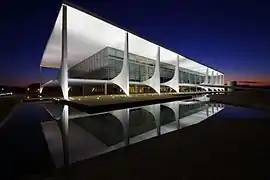
.jpg.webp)
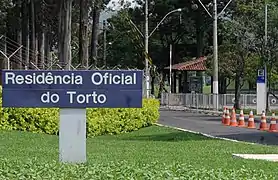
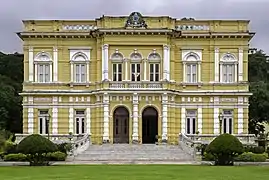
.jpg.webp)
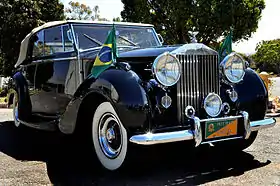
.jpg.webp) Main presidential aircraft (VC-1A)
Main presidential aircraft (VC-1A)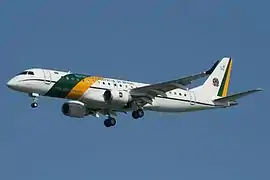
.jpg.webp) Presidential helicopter (VH-34 and VH-36)
Presidential helicopter (VH-34 and VH-36)
Removal
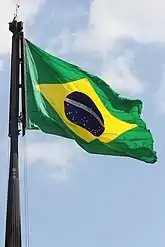
The president may be removed from office[24] using one of two procedures. In either case, two-thirds of the Chamber of Deputies must accept charges against the officeholder (impeachment); and if the Senate accepts the investigation, the president is suspended from exercising the functions of office for up to 180 days. In the case of "common criminal offenses", a trial then takes place at the Supreme Federal Court. In the case of "crimes of malversation", which must fall into one of seven broad areas and which is defined in more detail in law, a trial takes place at the Federal Senate. During the trial, the vice president exercises executive power. If the trial does not result in a conviction within 180 days, the president resumes office; a conviction results in removal from office and succession by the vice president. The seven areas are:[24]
- The existence of the Union
- The free exercise of the Legislative Power, the Judicial Power, the Public Prosecution and the constitutional Powers of the units of the Federation
- The exercise of political, individual and social rights
- The internal security of the country
- Probity in the administration
- The budgetary law
- Compliance with the laws and with court decisions
Post-presidency
The following privileges are guaranteed to former presidents by law:
- Permanent security protection (by the presidential guard – Batalhão da Guarda Presidencial)
- The use of two official vehicles (for life)
- Repository funding for a presidential library
- Lifelong monthly pension for their widows and unmarried daughters
- Pension for sons of deceased ex-presidents until they come of age
As of 5 February 2021, there are six living former presidents and one incumbent president. The most recent death of a former president was that of Itamar Franco (1992–95), on 2 July 2011.
- Living former Presidents

.jpg.webp)

.jpg.webp)

.jpg.webp)
Office-holders
All presidents of Brazil have borne the title President of the Republic. That title has been used by all the constitutions of Brazil since the proclamation of the Republic to refer to the head of the Executive Branch.However, from the proclamation of the Republic in 1889 until 1937 the country was officially styled Republic of the United States of Brazil, and from 1937 to 1967 the country was styled simply The United States of Brazil, and thus the full title of the presidents of the Republic from 1891 until 1967—that is, from Deodoro da Fonseca's inauguration as President (between 1889 and 1891 he served as Head of the Provisional Government) until the end of Humberto Castello Branco's term in 1967—was President of the Republic of the United States of Brazil. On 15 March 1967, the country's official name was changed to Federative Republic of Brazil. On that same date, Arthur da Costa e Silva was sworn in as President succeeding Castello Branco. Since Costa e Silva, therefore, all presidents of Brazil have borne the full title of President of the Federative Republic of Brazil.
.jpg.webp)
.jpg.webp)
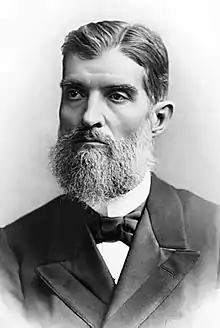
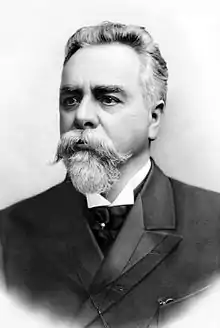
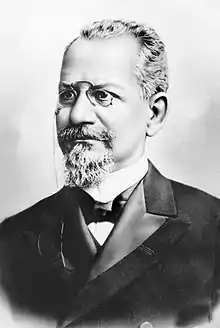
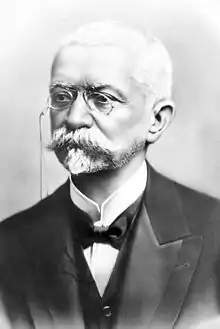
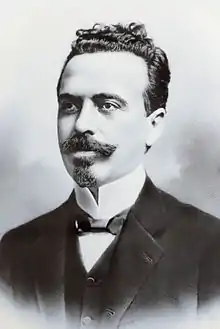
.jpg.webp)
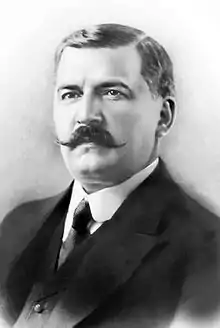
.jpg.webp)
.jpg.webp)
.jpg.webp)
.jpg.webp)
.jpg.webp)

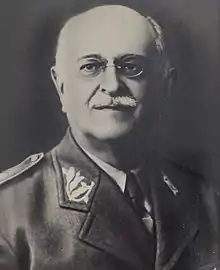

– Mena Barreto 1930 .jpg.webp)

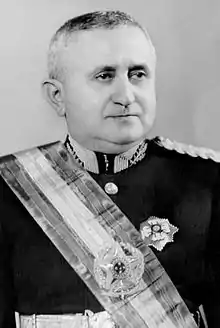
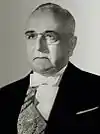
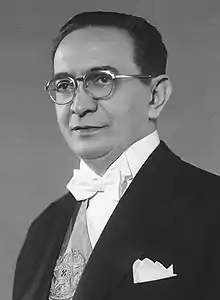
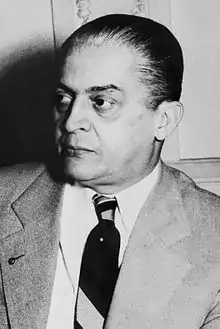
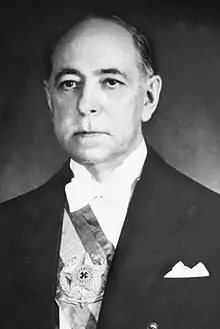

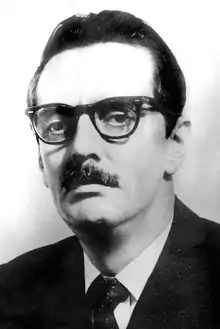
.jpg.webp)
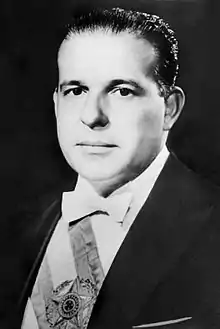
.jpg.webp)
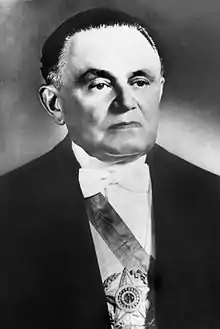
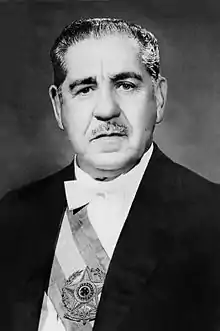




.tif.jpg.webp)
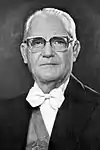
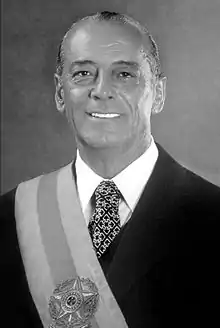
.jpg.webp)
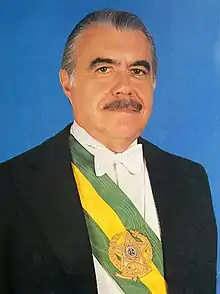
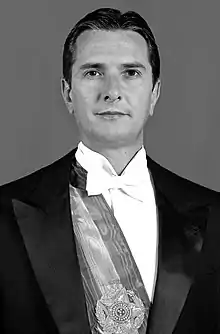
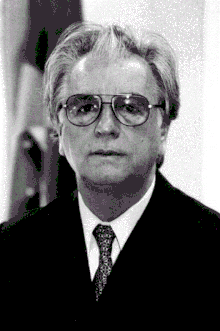
.jpg.webp)
.jpg.webp)
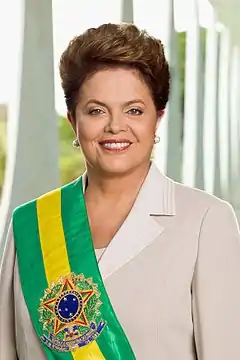
_-_cortada.jpg.webp)
_(cropped).jpg.webp)
Presidents by birth state
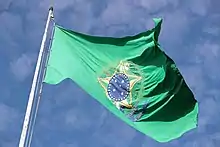
![]() Minas Gerais: 9 (Afonso Pena, Venceslau Brás, Delfim Moreira, Arthur Bernardes, Carlos Luz, Juscelino Kubitschek, Pedro Aleixo, Tancredo Neves, Dilma Rousseff)
Minas Gerais: 9 (Afonso Pena, Venceslau Brás, Delfim Moreira, Arthur Bernardes, Carlos Luz, Juscelino Kubitschek, Pedro Aleixo, Tancredo Neves, Dilma Rousseff)
![]() São Paulo: 7 (Prudente de Morais, Campos Sales, Rodrigues Alves, Júlio Prestes, Ranieri Mazzilli, Michel Temer, Jair Bolsonaro)
São Paulo: 7 (Prudente de Morais, Campos Sales, Rodrigues Alves, Júlio Prestes, Ranieri Mazzilli, Michel Temer, Jair Bolsonaro)
![]() Rio Grande do Sul: 6 (Hermes da Fonseca, Getúlio Vargas, João Goulart, Artur da Costa e Silva, Emílio Garrastazu Médici, Ernesto Geisel)
Rio Grande do Sul: 6 (Hermes da Fonseca, Getúlio Vargas, João Goulart, Artur da Costa e Silva, Emílio Garrastazu Médici, Ernesto Geisel)
![]() Rio de Janeiro: 5 (Nilo Peçanha, Washington Luís, João Figueiredo, Fernando Collor de Mello, Fernando Henrique Cardoso)
Rio de Janeiro: 5 (Nilo Peçanha, Washington Luís, João Figueiredo, Fernando Collor de Mello, Fernando Henrique Cardoso)
![]() Alagoas: 2 (Deodoro da Fonseca, Floriano Peixoto)
Alagoas: 2 (Deodoro da Fonseca, Floriano Peixoto)
![]() Ceará: 2 (José Linhares, Castelo Branco)
Ceará: 2 (José Linhares, Castelo Branco)
![]() Bahia: 2 (Itamar Franco,[25][26] Manuel Vitorino)
Bahia: 2 (Itamar Franco,[25][26] Manuel Vitorino)
![]() Mato Grosso: 1 (Eurico Gaspar Dutra)
Mato Grosso: 1 (Eurico Gaspar Dutra)
![]() Mato Grosso do Sul: 1 (Jânio Quadros)
Mato Grosso do Sul: 1 (Jânio Quadros)
![]() Maranhão: 1 (José Sarney)
Maranhão: 1 (José Sarney)
![]() Paraíba: 1 (Epitácio Pessoa)
Paraíba: 1 (Epitácio Pessoa)
![]() Pernambuco: 1 (Luiz Inácio Lula da Silva)
Pernambuco: 1 (Luiz Inácio Lula da Silva)
Latest election
| Candidate | Party | Running mate | Party | First round | Second round | |||
|---|---|---|---|---|---|---|---|---|
| Votes | % | Votes | % | |||||
| Jair Bolsonaro | PSL | Hamilton Mourão | PRTB | 49,277,010 | 46.03 | 57,796,972 | 55.13 | |
| Fernando Haddad | PT | Manuela d'Ávila | PCdoB | 31,342,051 | 29.28 | 47,038,792 | 44.87 | |
| Ciro Gomes | PDT | Kátia Abreu | PDT | 13,344,371 | 12.47 | |||
| Geraldo Alckmin | PSDB | Ana Amélia | PP | 5,096,350 | 4.76 | |||
| João Amoêdo | NOVO | Christian Lohbauer | NOVO | 2,679,745 | 2.50 | |||
| Cabo Daciolo | PATRI | Suelene Balduino | PATRI | 1,348,323 | 1.26 | |||
| Henrique Meirelles | MDB | Germano Rigotto | MDB | 1,288,950 | 1.20 | |||
| Marina Silva | REDE | Eduardo Jorge | PV | 1,069,578 | 1.00 | |||
| Alvaro Dias | PODE | Paulo Rabello de Castro | PSC | 859,601 | 0.80 | |||
| Guilherme Boulos | PSOL | Sônia Guajajara | PSOL | 617,122 | 0.58 | |||
| Vera Lúcia | PSTU | Hertz Dias | PSTU | 55,762 | 0.05 | |||
| José Maria Eymael | DC | Hélvio Costa | DC | 41,710 | 0.04 | |||
| João Vicente Goulart | PPL | Léo Dias | PPL | 30,176 | 0.03 | |||
| Invalid/blank votes | 10,313,159 | 8.79 | 11,094,570 | 10.58 | ||||
| Total | 117,364,654 | 100.00 | 115,930,334 | 100.00 | ||||
| Registered voters/turnout | 147,306,295 | 79.67 | 147,306,294 | 78.70 | ||||
| Source: TSE (runoff election at 100% of "sections" counted) | ||||||||
See also
- List of Presidents of Brazil
- List of Presidents of Brazil by longevity
- Brazilian presidential inauguration
- Politics of Brazil
- Cabinet of Brazil
- Vice President of Brazil
- Brazilian Air Force One
- Presidential Guard Battalion (Brazil)
References
- "Decreto nº 9.758, de 11 de abril de 2019" (in Portuguese) (70-A). Impressa Nacional. 11 April 2019: 5. ISSN 1677-7042. Retrieved 4 February 2021. Cite journal requires
|journal=(help) - Portal da Transparência, Ministry of Transparency, Supervision and Control. Retrieved on 29 May 2018. (in Portuguese)
- Constitution of the Federative Republic of Brazil, art. 15 and Chapter II
- "Right-Wing Populist Jair Bolsonaro Sworn In As President Of Brazil". NPR. 1 January 2019. Retrieved 1 January 2019.
- Constitution of the Federative Republic of Brazil, art. 62 as amended by constitutional amendment n. 32
- Constitution of the Federative Republic of Brazil, article 14, paragraph 3.
- Constitution of the Federative Republic of Brazil, article 82.
- Constitution of the Federative Republic of Brazil, article 14, paragraph 5.
- "G1 > Política - NOTÍCIAS - Terceiro mandato é 'legal e constitucional', diz Dirceu". g1.globo.com. Retrieved 3 April 2020.
- Constitution of the Federative Republic of Brazil, article 14, paragraph 6.
- Official Writing Manual of the Presidency of the Republic. 2nd edition 2002. ISBN 8585142162
- Diário da União publica reajuste de salários de parlamentares, presidente e ministros ("Brazilian 'Federal Register' publishes a pay raise for senators, representatives, president and ministries"), Estado de Minas, Belo Horizonte, 19 December 2014. Retrieved on 29 May 2018. (in Portuguese)
- Ajuste ainda não chegou aos gastos sigilosos ("Cuts have yet to be made to undisclosed expenses") Archived 14 July 2011 at the Wayback Machine Ministério do Planejamento. Retrieved on 27 May 2011. (in Portuguese)
- Palácio do Planalto Archived 21 September 2016 at the Wayback Machine Presidência da República. Retrieved on 27 May 2011. (in Portuguese).
- Palácio da Alvorada Archived 13 August 2011 at the Wayback Machine Presidência da República. Retrieved on 27 May 2011. (in Portuguese).
- Granja do Torto Archived 13 August 2011 at the Wayback Machine Presidência da República. Retrieved on 27 May 2011. (in Portuguese).
- Rio Negro Palace Prefeitura de Petrópolis. Retrieved on 27 May 2011.
- "Carros blindados para as famílias de Bolsonaro e Mourão". O Antagonista. 25 May 2019.
- Rolls-Royce presidencial é um dos destaques do desfile de 7 de setembro ("Presidential Rolls Royce is one of the highlights of the Independence Day parade") Archived 21 July 2011 at the Wayback Machine Presidência da República. Retrieved on 27 May 2011. (in Portuguese).
- Infográfico especial sobre o avião presidencial ("Special infographic of the presidential airplane") Archived 27 May 2011 at the Wayback Machine Presidência da República. Retrieved on 27 May 2011. (in Portuguese).
- FAB 001 – O Avião Presidencial Archived 26 June 2015 at the Wayback Machine DefesaBR. Retrieved on 27 May 2011. (in Portuguese).
- Presidência da República nas asas da Embraer ("The Presidency on the wings of Embraer") Archived 21 July 2011 at the Wayback Machine Presidência da República. Retrieved on 27 May 2011. (in Portuguese).
- Helicóptero Presidencial Brasileiro (VH-34 Super Puma VIP) ("Brazilian Presidential Helicopter (VH-34 Super Puma VIP))" Hangar20. Retrieved on 27 May 2011. (in Portuguese).
- Constitution of the Federative Republic of Brazil 1988 - SECTION III - LIABILITY OF THE PRESIDENT OF THE REPUBLIC (English translation)
- Born in a ship at the sea, was registered in Salvador.
- Portal do Governo Brasileiro | Atualize sua Barra de Governo biblioteca.presidencia.gov.br
External links
| Wikimedia Commons has media related to Presidents of Brazil. |
- Official website of the Presidency of the Republic (in Portuguese)
.jpg.webp)